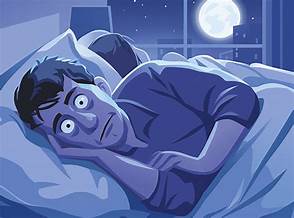 Your behaviors during the day, and especially before bedtime, can have a major impact on your sleep. They can promote healthy sleep or contribute to sleeplessness.
Your behaviors during the day, and especially before bedtime, can have a major impact on your sleep. They can promote healthy sleep or contribute to sleeplessness.
This is important because too little sleep can mimic or cause a variety of mental health problems. For example, lack of sleep can cause significant irritability, which might be mistaken for Depression (especially in boys and men) or Bipolar Disorder. Extreme sleep deprivation can cause auditory or visual hallucinations, which are symptoms of Schizophrenia. I have seen children and adults treated with powerful psychiatric medications when they were actually suffering from sleeplessness!
 Difficulties with sleep can make psychiatric disorders worse by making the person confused or frustrated, as well as more sensitive to pain and other medical problems.
Difficulties with sleep can make psychiatric disorders worse by making the person confused or frustrated, as well as more sensitive to pain and other medical problems.
People who are depressed have a tendency to wake up early, and then cannot fall asleep again. This can make their depression worse, because the amount of sleep a person gets has an effect on their illness. People who don’t have a psychiatric illness but suffer from insomnia are more likely to develop a disorder like depression later in their life.
 Insomnia can also have negative effects on treatment of psychiatric disorders. The treatment itself can cause sleep problems; for instance, some medications used to treat these disorders have side effects that can make it difficult for patients to fall or stay asleep.
Insomnia can also have negative effects on treatment of psychiatric disorders. The treatment itself can cause sleep problems; for instance, some medications used to treat these disorders have side effects that can make it difficult for patients to fall or stay asleep.
Your daily routines – what you eat and drink, the medications you take, how you schedule your days and how you choose to spend your evenings – can significantly impact your quality of sleep. Even a few slight adjustments can, in some cases, mean the difference between sound sleep and a restless night. Completing a two-week sleep diary can help you understand how your routines affect your sleep.
Sleep Hygiene
The term “sleep hygiene” refers to a series of healthy sleep habits that can improve your ability to fall asleep and stay asleep. These habits are a cornerstone of cognitive behavioral therapy, the most effective long-term treatment for people with chronic insomnia. CBT can help you address the thoughts and behaviors that prevent you from sleeping well. It also includes techniques for stress reduction, relaxation and sleep schedule management.
If you have difficulty sleeping or want to improve your sleep, try following these healthy sleep habits. Talk to your doctor or a therapist trained in Cognitive Behavior Therapy for Insomnia (CBT-I) if your sleep problem persists. You also can seek help from the sleep team at an AASM accredited sleep center.
Quick Sleep Tips
Follow these tips to establish healthy sleep habits:
- Stick to a consistent sleep schedule. Go to bed and get up at the same time every day, even on weekends or during vacations. Being consistent reinforces your body’s sleep-wake cycle.
- Set a bedtime that is early enough for you to get at least 7 hours of sleep (Some people need more; few need less)
- Don’t go to bed unless you are sleepy.
- If you don’t fall asleep after 20 minutes, get out of bed. Leave the bedroom and do something relaxing. Read. Listen to soothing music. Do not do anything that involves a screen (e.g., TV, video game, computer, smart phone).
- Establish a relaxing bedtime routine.
- Use your bed only for sleep and sex. Don’t do anything else in bed.
- Make your bedroom quiet and relaxing. Keep the room at a comfortable, cool temperature.
- Limit exposure to bright light in the evenings. Especially avoid devices with screens, such as TVs, video games, smart phones, tablets and computers.
- Turn off electronic devices at least 30 minutes before bedtime. If your digital devices have “blue filters,” activate them)
- Don’t eat a large meal before bedtime. If you are hungry at night, eat a light, healthy snack.
- Exercise regularly and maintain a healthy diet (Do not exercise at night).
- Avoid caffeine in the late afternoon or evening.
- Avoid alcohol before bedtime (Alcohol may help you fall asleep, but it will wake you after a few hours)..
- Reduce your fluid intake before bedtime.